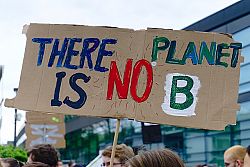

Today (Monday 22 April) is World Earth Day 2024, which marks the anniversary of the birth of the modern environment movement in 1970.
Earth Day is a reminder of the importance of environmental conservation and sustainability, encouraging us to come together and take action for a healthier planet and brighter future.
Since its creation, it has become a global movement, inspiring many to take action to protect and enhance the planet and, in doing so, improving human health.
Through various events, toolkits, and initiatives, Earthday.org aims to:
The History of World Earth Day
In the decades leading up to the first World Earth Day, Americans were consuming vast amounts of leaded gas through massive and inefficient automobiles. Industry released smoke and sludge with little fear of the consequences from either the law or press.
Air pollution was commonly accepted and mainstream America remained largely oblivious to environmental concerns and how a polluted environment threatens human health. The publication of Rachel Carson's book Silent Spring in 1962 represented a watershed moment. The book sold more than 500,000 copies in 24 countries, and it raised public awareness and concern for living organisms, the environment, and the links between pollution and public health.
Senator Gaylord Nelson, the junior senator for Wisconsin had long been concerned about the deteriorating environment in the United States. In January 1969, he and many others witnessed the damaging effects of a massive oil spill in Santa Barbara. Inspired by the student anti-war movement, Nelson wanted to infuse the energy of student anti-war protests with an emerging public consciousness about air and water pollution.
He announced the idea for a teach-in on college campuses to the national media. Nelson recruited Denis Hayes, a young activist, to organise the campus teach-ins and to scale the idea to a broader public. They chose 22 April, a weekday between Spring Break and Final Exams, to maximise student participation.
Hayes built a national staff of 85 to promote events across the land and the effort soon broadened to include a wide range of organisations, faith groups and others. They changed the name to Earth Day which immediately sparked national media attention and caught on across the country. It inspired 20 million Americans, 10% of the population at the time, to take to the streets, parks and auditoriums to demonstrate against the impacts of 150 years of industrial development which had left a growing legacy of serious human health impacts.
By 1990 Earth Day went truly global, mobilising 200 million people in 141 countries, and lifting environmental issues onto the world stage. Earth Day 1990 gave a huge boost to recycling efforts worldwide, and helped to pave the way for the 1992 United Nations Earth Summit in Rio de Janeiro.
Earth Day continued to be a huge global day since, with the Paris Agreement, the most significant international climate accord in history, being opened for signature on Earth Day in 2016.
Planet v Plastics
Plastics are a danger to humanity and all living creatures, disrupting the delicate balance of life on Earth.
Earthday.org is unwavering in their commitment to end plastics for the sake of human and planetary health, demanding a 60% reduction in the production of all plastics by 2040.
This years theme is Planet v Plastics, which calls to advocate for:
The theme unites students, parents, businesses, governments, churches, unions, individuals and NGOs to call for the end of plastics for the sake of human and planetary health.
Kathleen Rogers, President of Earthday.org, said: "The Planet vs. Plastics campaign is a call to arms, a demand that we act now to end the scourge of plastics and safeguard the health of every living being upon our planet".
How to get involved
Here are some ways to get involved this World Earth Day:
For more information on this subject, see: